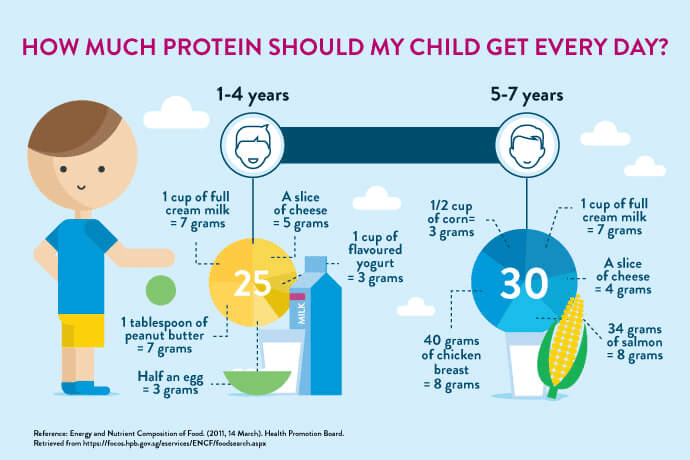
There are many kinds of protein shakes for children which include the necessary nutrients needed by them to develop and grow properly. The dietary needs of children are different from that of adults; children need more protein in their diet, which is why protein powders for children and adults are different.1 It is believed that children may require up to 1g of protein per pound of body weight per day. It has been noticed that protein shaker is more suitable for kids and adults because it does not add fat to the meal.2
This would ensure that the supplements are absorbed well by the body, ensuring quick results. There are many protein powders available on the market; however, it is suggested that parents choose the ones that contain the essential vitamins and minerals that their child needs.
One should always choose the protein powder that contains a good amount of protein and essential vitamins. However, protein powder is also safe for kids; but the proper intake must be ensured. In an average scenario, kids may be consuming the right amount of protein he needs in his diet; but sometimes, his nutritional requirements may be overlooked due to the absence of these supplements.
Is Protein Beneficial For Children?
Protein is a major component of the building blocks of muscles and bones, so it is very important for kids to get plenty of protein every day. There are many benefits of protein shakes for kids, but one question that parents often ask is whether or not protein powder is beneficial to children. The truth is that protein powder can be a great way to get kids to eat foods that they might normally steer clear of, such as cheese, meat, milk, and yogurt.3
There are actually a lot of protein benefits for kids. For instance, there are protein supplements on the market that can be used by kids without them even knowing it. Some supplements are labeled as “natural” and do not list any ingredients, so parents need to read the label carefully. If the supplement is natural, it should not cause any adverse reactions, but it is best to double-check. If the supplement has some artificial additives, it should be avoided as well.4
In addition to protein powder being beneficial for kids, it can also be a healthy choice for adults. A lot of protein powder is made with whey, which is a great protein concentrate for the body. Whey is a complete protein that is excellent for building muscle and can help in weight loss.5 Protein is a key ingredient in building and repairing muscle tissue after a workout, so there is no reason not to include protein in the diet.6
Dangers of Excess Protein For Children
There are many dangers of excess protein for children. Some of these dangers of protein include but are not limited to, high cholesterol, kidney stones and osteoporosis, growth deficiencies, skin rashes, asthma, ADHD, and even cancer. Excess protein intake can also lead to thinning hair, excess fat gain in the body, and an increase the risk of heart attacks and strokes.7 However, all of these dangers of protein are only relative.
Protein can be a very good thing and can be added to your child’s diet without too much worry. With the proper intake of protein, children can have a healthy and varied diet that is filled with everything from milk to cheese to meat.8 A protein shake is one option to consider when introducing high protein foods into a child’s diet, but it is important to remember that these shakes should only be a small portion of their daily intake. If a child eats too much protein, it can be difficult to get rid of the excess and can cause health problems in children as young as four years old.9
What is the Best Age for Children to Start Consuming Protein Supplements?
There are many debates when it comes to determining what is the best age for children to start consuming protein supplements. Some experts advise starting children as young as two, while others believe children should wait until they are at least four years old. Even within these different age groups, there is a wide variation in protein consumption among children.10 One way to judge what is the best age for children to start consuming protein supplements is to gauge their protein consumption after a particular activity.
Young athletes who have just started playing sports may need protein supplements to help boost their protein consumption immediately following a training session. This is important because the muscles that are used during this time are very fragile and protein can be severely depleted by just one bite of food. Protein supplements for kids can also be an effective way for young children to help meet their daily protein requirements. The recommended protein intake for children is one gram of protein per pound of body weight.11 For children who are four to seven years old, protein supplements for kids are also a good way to help them meet their daily protein needs.
Protein supplements for kids can also help a young athlete to regain strength and stamina when they begin a sport-related regimen. Many people believe that protein should only be consumed after strenuous activity, but the fact of the matter is that it can actually play an important role in muscle development and recovery even before a child has begun a sport-related regimen. Although most athletes agree that protein supplements for kids can play a significant role in a child’s sports performance, they must be used cautiously due to the growing amount of science that suggests that high protein diets may be detrimental to young athletes.12
Image Credits
Pexels / May 19, 2021
Abbott Family / 2021
Levels / August 25, 2021
1 “Nutrition for kids: Guidelines for a healthy diet – Mayo Clinic.” https://www.mayoclinic.org/healthy-lifestyle/childrens-health/in-depth/nutrition-for-kids/art-20049335 Accessed 22 Jul. 2021.
2 “Nutritional Needs of Young Children (Age 5-10) – News Medical.” 26 Feb. 2019, https://www.news-medical.net/health/Nutritional-Needs-of-Young-Children-(Age-5-10).aspx Accessed 22 Jul. 2021.
3 “Childhood Nutrition Facts | Healthy Schools | CDC.” https://www.cdc.gov/healthyschools/nutrition/facts.htm Accessed 22 Jul. 2021.
4 “Protein Powder for Kids: Is It Safe? – WebMD.” 2 Mar. 2021, https://www.webmd.com/children/is-protein-powder-safe-for-children Accessed 22 Jul. 2021.
5 “Protein Powder for Kids: Is it Safe? – Healthline.” 27 Jan. 2020, https://www.healthline.com/health/childrens-health/protein-powder-for-kids Accessed 22 Jul. 2021.
6 “Protein: Why Your Body Needs It – WebMD.” https://www.webmd.com/diet/benefits-protein Accessed 22 Jul. 2021.
7 “Is Your Child Eating Too Much Protein? | Parents.” 7 Jan. 2015, https://www.parents.com/recipes/scoop-on-food/is-your-child-eating-too-much-protein/ Accessed 22 Jul. 2021.
8 “What If My Child Is Getting Too Much Protein? | Livestrong.com.” https://www.livestrong.com/article/489778-what-if-my-child-is-getting-too-much-protein/ Accessed 22 Jul. 2021.
9 “Protein Drinks for Kids: Dosage, Safety, Side Effects – WebMD.” 2 Mar. 2021, https://www.webmd.com/children/is-it-safe-to-give-a-child-protein-drinks Accessed 22 Jul. 2021.
10 “At What Age Can One Take Whey Protein? – Healthy Eating | SF Gate.” https://healthyeating.sfgate.com/age-can-one-whey-protein-12175.html Accessed 22 Jul. 2021.
11 “Protein Shakes and Health: Is There an Age Limit? | Livestrong.com.” 17 Dec. 2020, https://www.livestrong.com/article/500758-what-age-can-you-start-taking-protein-powder/ Accessed 22 Jul. 2021.
12 “How Much Protein Does My Child Need? | Strong4Life.” https://www.strong4life.com/en/feeding-and-nutrition/mealtimes/how-much-protein-does-my-child-need Accessed 22 Jul. 2021.



